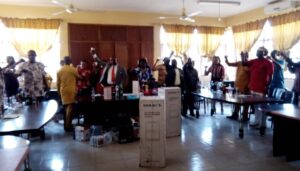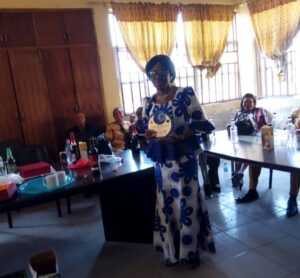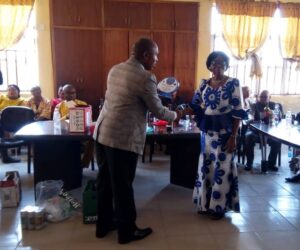Department Of Biochemistry
- Introduction
- Philosophy of the Programme
- Aims and Objectives of the Programme
- About Us
- Staff List
- Courses
- Our Programme
- Inside Biochemistry
- Student Association
Welcome Message/Address from the HOD
In Biochemistry Department FUTO, the philosophy of our degree program is to produce graduates with an in-depth knowledge of both the practical and theoretical aspects of Biochemistry that would be broad enough to permit self-employment after graduation. We also produce graduates that will take up employment within and outside the country in any aspect of Biochemistry and/or related endeavours.
We provide students with knowledge and skills base from which they can proceed to further studies in specialized areas of Biochemistry or multi-disciplinary areas involving Biochemistry. This in effect, provide thorough training and orientation, an appreciation of the solitary rewards of inter and multidisciplinary approach to life problems.
At the postgraduate level, the Department of Biochemistry offers courses leading to the award of PGD, M.Sc and Ph.D degrees in the following areas of specialization:
- Industrial Biochemistry
- Environmental Biochemistry
- Medical Biochemistry
- Pharmacological Biochemistry
- Molecular Biology
- Enzymology/Protein Chemistry and
- Nutritional Biochemistry
The philosophy of our degree programme is to produce graduates with an in-depth knowledge of both the practical and theoretical aspects of Biochemistry that will be broad enough to permit self-employment after graduation. We also hope to produce graduates that will take up employment within and outside the country in any aspect of Biochemistry and/or related endeavours.
The main aim and objective of the degree programme in biochemistry should be:
- To provide students with a broad and balanced foundation of biochemical knowledge and practical skills.
- To develop in students the ability to apply knowledge and skills to solving theoretical and practical problems in biochemistry.
- to develop in students, a range of transferable skills that are of value in biochemical and non-biochemical employment.
- To provide students with knowledge and skills base from which they can proceed to further studies in specialized areas of biochemistry or multi-disciplinary areas involving biochemistry.
- To provide, through training and orientation, an appreciation of the solutory rewards of inter-and multi-disciplinary approach to the solution of complex life problems.
- To generate in students an appreciation of the importance of biochemistry in industrial, economic, environmental, technological and social of complex life problems.
- To install in students a sense enthusiasm for biochemistry, an appreciation of its application in different contexts and to involve them in an intellectually stimulating and satisfying experience of learning and studying.
Also, the course is designed to expose students to all the major areas of Biochemistry through series of lectures, laboratory exercises and tutorials. In the fourth year, students are exposed to industrial work experience in many relevant industries to complement their lectures and tutorials and as an advancement and actual realization of the practical benefits associated with the programme. In the fifth year, students are given the opportunity to develop more specialized understanding through an extended research project. A six-month industrial attachment is an important component of the course in the Rain Semester of the fourth year.
The Biochemistry programme in the Federal University of Technology, Owerri, came into existence in 1986 as a unit of the omnibus Department of Biological Sciences in the School of Natural and Applied Sciences (SNAS) under the headship of the then Dr. (Mrs.) B. N. Anyanwu. In 1988, the Department of Biological Sciences was expanded with degree options in Industrial Microbiology and Industrial Biochemistry. The curricula for Industrial Microbiology and Industrial Biochemistry options were approved by Senate in 1989/90 academic session. In the 2002/2003 session, the University Senate approved the creation of the Department of Biochemistry. By the year 2003, the Department of Biological Sciences was eventually demerged and out of it came four administratively autonomous departments viz: Biochemistry, Industrial Microbiology, Biotechnology and Molecular Biology. Prof. A. I. Ukoha was appointed the pioneer Head of Department. Since then, FUTO has operated and awarded undergraduate and postgraduate degrees in Biochemistry. Molecular Biology was later collapsed into Biotechnology and a new Department of Biological Sciences emerged.
A Chronicle of Departmental Headship since Inception
DEPARTMENT OF BIOLOGICAL SCIENCES
- Dr. (Mrs.) B. N. Anyanwu
1986 – 1991 - Prof. A. I. Ukoha
1991 – 1992 - Prof. M. O. E. Iwuala
1992 – 1993 - Dr. L. E. Aririatu
1993 – 1996 - Prof. P. T. E. Ozoh
1996 – 1999 - Prof. G. O. C. Onyeze
1999 – 2002 - Dr. F. O. U. Osuala
2002 – 2003
DEPARTMENT OF BIOCHEMISTRY
- Prof. A. I. Ukoha
2003 – 2006 - Dr. (Mrs.) N. C. Agha
2006 – 2008 - Dr. O. A. Ojiako
2008 – 2011 - Dr. R. N. Nwaoguikpe
2011 – 2013 - Prof. N. Nwachukwu
2013 – 2015 - Prof. G.O.C. Onyeze
2015 – 2016 - Dr. K.M.E. Iheanacho
2016 – 2018 - Prof. O.A. Ojiako
2018 – 2019 - Prof. A.C. Ene
2019 – Date
Staff List
| S/No. | NAME | DESIGNATION | AREA OF INTEREST | |
|---|---|---|---|---|
| 1 | ONWULIRI VIOLA ADAKU | PROFESSOR | PhD | CLINICAL BIOCHEMISTRY |
| 2 | NWACHUKWU NGWU | PROFESSOR | PhD | NUTRITIONAL TOXICOLOGY |
| 3 | NWAOGUIKPE REGINALD N. | PROFESSOR | PhD | CLINICAL BIOCHEMISTRY |
| 4 | OKWU GLORIA NKEIRU | PROFESSOR | PhD | NUTRITIONAL BIOCHEMISTRY |
| 5 | ALISI CHINWE SYLVANUS | PROFESSOR | PhD | CLINICAL BIOCHEMISTRY |
| 6 | IHEANACHO KIZITO MUNACHISO ENYEREIBEYEM | PROFESSOR | PhD | ENZYMOLOGY |
| 7 | ENE ALOYSIUS CHINEDU | PROFESSOR | PhD | CLINICAL BIOCHEMISTRY |
| 8 | IBEGBULEM CHIEDOZIE ONYEJIAKA | PROFESSOR | PhD | INDUSTRIAL BIOCHEMISTRY |
| 9 | NWAOGU LINUS AHUMARAEZE | READER | PhD | ENVIRONMENTAL BIOCHEMISTRY |
| 10 | EMEJULU ADAMMA ANGELA | READER | PhD | CLINICAL BIOCHEMISTRY |
| 11 | IGWE CHIDI UZOMA | SENIOR LECTURER | PhD | CLINICAL BIOCHEMISTRY |
| 12 | UJOWUNDU COSMAS ONYEKACHI | SENIOR LECTURER | PhD | ENVIRONMENTAL BIOCHEMISTRY |
| 13 | IGWE KALU OKEREKE | SENIOR LECTURER | PhD | CLINICAL BIOCHEMISTRY |
| 14 | ONUOHA CHINYERE HENRIETTA | LECTURER I | PhD | CLINICAL BIOCHEMISTRY |
| 15 | UJOWUNDU FAVOUR NTITE | LECTURER I | PhD | CLINICAL BIOCHEMISTRY |
| 16 | IHEME CALLISTUS IZUNNA | LECTURER II | PhD | ENVIRONMENTAL TOXICOLOGY |
| 17 | UKAIRO DORIS IFEYINWA | LECTURER II | PhD | CLINICAL BIOCHEMISTRY |
| 18 | NZEBUDE CHIAMAKA PERPETUAL | LECTURER II | PhD | CLINICAL BIOCHEMISTRY |
| 19 | EZIRIM AMANDA UGOCHI | LECTURER II | PhD | CLINICAL BIOCHEMISTRY |
| 20 | CHUKWUDORUO, CHIEME SUNDAY | LECTURER II | PhD | PHARMACOLOGY |
| 21 | NJOKU, GODWIN CHIAKA | LECTURER II | PhD | CLINICAL BIOCHEMISTRY |
| 22 | MBA BLESSING AMARACHI | ASSISTANT LECTURER | MSc | CLINICAL BIOCHEMISTRY |
| 23 | IBEH, RAYMOND C. | ASSISTANT? LECTURER | MSc | CLINICAL BIOCHEMISTRY |
| 24 | NTAJI, OLUWATOSIN ELIZABETH | ASSISTANT LECTURER | MSc | CLINICAL BIOCHEMISTRY |
| 25 | CHIGBU, IFEYINWA NKECHINYERE | ASSISTANT LECTURER | MSc | CLINICAL BIOCHEMISTRY |
| 26 | HARUNA, MOSHOOD ABIOLA | ASSISTANT LECTURER | MSc | CLINICAL BIOCHEMISTRY |
| 27 | THADDEUS ONYEBUCHI UKWUEZE | ASSISTANT LECTURER | MSc | CLINICAL BIOCHEMISTRY |
| 28 | OBASI UCHECHI KINGSLEY | ASSISTANT LECTURER | MSc | CLINICAL BIOCHEMISTRY |
| 29 | NWUFO CHEKWUBE. KANAYO | ASSISTANT LECTURER | MSc | CLINICAL BIOCHEMISTRY |
| 30 | ESONU CHIMDI EZICHI | GRADUATE ASSISTANT | BSc | |
| 31 | OSUJI-KALU IBE, NNENNA C. | GRADUATE ASSISTANT | BSc | |
| 32 | MORAH, ARTHUR CHUKWUDUBEM | GRADUATE ASSISTANT | BSc | |
| 33 | WINIFRED, NJIDEKA NSOFOR | GRADUATE ASSISTANT | BSc | |
| 34 | OSUAGWU, OLACHI LILIAN | GRADUATE ASSISTANT | BSc | |
| 35 | EZERIOHA, CARYNE CHIDINMA | GRADUATE ASSISTANT | BSc | |
| 36 | NJOKU, ONYINYECHI CHIJIOKE | GRADUATE ASSISTANT | BSc | |
| 37 | DIKE CHINAZA SHEDRACH | GRADUATE ASSISTANT | BSc | |
| 38 | UBA, MUHAMMAD TASI’U | GRADUATE ASSISTANT | BSc | |
| 39 | MR. CHINWEUBA G. NWAEKPE | GRADUATE ASSISTANT | BSc | |
| 40 | MR. ILOABUCHI GODIAN | GRADUATE ASSISTANT | BSc |
Course Allocation
Course Distribution for Harmattan Semester (2019/2020 Academic Session)
| S/NO | COURSE CODE | TITLE OF COURSE | LECTURERS |
|---|---|---|---|
| 1 | BCH 201 | Biochemistry of Carbohydrates and lipids | *COI, CHO, CSC, CII, UAE, UKO |
| 2 | BCH 301 | Enzymology | *BAM, DIU, NN, EON, NIC, MAH |
| 3 | BCH 303 | Biochemical Techniques | *FNU, KOI, BAM, CSA, NIC |
| 4 | BCH 307 | Membrane Biochemistry | *BAM, CKN, RCI, EON, TOU |
| 5 | BCH 309 | Introduction to Immunology and Immunochemistry | *CKN, UAE, AAE, RNN, TOU |
| 6 | BCH 401 | Metabolic Pathways II | *DIU, LAN, FNU, EON, MAH |
| 7 | BCH 403 | Advanced Enzymology | *GCN, RCI, NN, COI, KMEI |
| 8 | BCH 405 | Biotechnology and Genetic Engineering | * UAE, AAE, BAM, CKN, TOU |
| 9 | BCH 407 | Bioinorganic Chemistry | *KOI, RCI, GNO, VAO, COU, NIC |
| 10 | BCH 409 | Metabolic Regulation | *CII, EON, RNN, GCN, MAH |
| 11 | BCH 411 | Industrial Biochemistry | *CKN, CPN, ACE, FNU, RCI |
| 12 | BCH 501 | Advanced Biochemical Methods | *CSC, CPN, CUI, KOI, CII |
| 13 | BCH 503 | Plant/Phytobiochemistry | *CPN, UKO, DIU, LAN |
| 14 | BCH 505 | SEMINAR/Project | ALL LECTURERS – CSC* |
| 15 | BCH 507 | Pharmacological Biochemistry | *CHO, KMEI, CSA, ACE |
| 16 | BCH 509 | Biochemistry of Foods and Nutrition | *UKO, VAO, COU, GNO, CSC |
| 17 | BCH 511 | Cell and Tissue Culture Techniques | * UAE, CHO, CUI, GCN |
*Course Coordinator
NN: Prof. N. Nwachukwu; RNN: Prof. R.N. Nwaoguikpe; GNO: Prof. G.N. Okwu; CSA: Prof. C.S. Alisi; KMEI: Prof. K.M.E. Iheanacho; COI: Prof. C.O. Ibegbulem; Prof. A.C. Ene; LAN: Dr. L.A. Nwaogu; AAE: Dr. (Mrs) A.A. Emejulu; CUI: Dr. C.U. Igwe; COU: Dr. C.O. Ujowundu; KOI: Dr. K.O. Igwe; CHO: Dr. (Mrs) C.H. Onuoha; GCN: Mr. G.C. Njoku; CII: Dr. C.I. Iheme; PCN: Dr. (Mrs) P.C. Nzebude; DIU: Dr. (Mrs) D.I. Ukairo; UAE: Ms. U.A. Ezirim; FNU: Dr. (Mrs) F.N. Ujowundu; CSC: Dr. C.S. Chukwudoruo; BAM: Mrs. B.A. Mbah; UKO: Mr. U.K. Obasi; CKN: Mr. C.K. Nwufor; EON: Mrs. E.O. Ntaji; NIC: Mrs. N.I. Chigbu; RCI: Mr. R.C. Ibe; TON: Mr. T.O. Ukwueze; MAH: Mr. M.A. Haruna.
Course Outline
Undergraduate Course Outline
Undergraduate Courses
100 Level
UNDERGRADUATES
YEAR ONE (1)
HARMATTAN SEMESTER
| COURSE CODE. TITLE L. T. P. UNITS |
|---|
| MTH 101 – ELEM. MATHS I 3. 1. 0 4 |
| PHY 101 – GEN. PHYSICS I 2. 1. 1 4 |
| CHM 101 – GEN. CHEMISTRY I 2. 1. 1 4 |
| BIO 101/103 – BIOLOGY FOR AGRIC AND BIOLOGICAL SC.I 2. 0. 1 3 |
| ENG 101 – WORKSHOP PRACTICE I 0. 0. 1 1 |
| ENG 103 – ENGINEERING DRAWING I 0. 0. 1 1 |
| GST 101 – USE OF ENGLISH I 2. 0. 0 2 |
| GST 103 – HUMANITIES 1.0.0. 1 |
| Elective – 1. 0. 0 1 |
| Total – 21 UNITS |
| Elective |
| FRN – French 101 |
| IGB – Igbo 101 |
RAIN SEMESTER
| COURSE NO. TITLE L. T. P. UNITS |
|---|
| MTH 102 – ELEM. MATHS II 3. 1. 0 4 |
| PHY 102 – GEN. PHYSICS I I 2. 1. 1 4 |
| CHM 102 – GEN. CHEMISTRY II 2. 1. 1 4 |
| BIO 102/104 -BIOLOGY FOR AGRIC AND BIOLOGICAL SC. II 1. 0. 1 2 |
| ENG 104 – ENGINEERING DRAWING II 0. 0. 1 1 |
| GST 102 – USE OF ENGLISH II 1. 1. 0 2 |
| GST 108 – SOCIAL SCIENCE I 1. 1. 0 2 |
| GST 110 – SCEINCE, TECHNOLOGY AND SOCIETY 1. 0. 0 1 |
| Elective 1. 0. 0 1 |
| Total – 21 UNITS |
| ELECTIVE |
| Igbo – Igbo 102 |
| FRN – French 102 |
200 Level
YEAR TWO (2)
HARMATTAN SEMESTER
| COURSE CODE. TITLE L. T. P. UNITS |
|---|
| BCH 201 – CHEMISTRY OF CARBOHYDRATES & LIPIDS 2. 0. 1 3 |
| MCB 201 – GENERALMICROBIOLOGY I 2. 0. 1 3 |
| CHM 201 – PHYSICAL CHEMISTRY I 2. 0. 1 3 |
| MTH/STAT 211 – STATISTICS 2. 0. 1 3 |
| CSC 201 – COMPUTER APPLICATIONS 2. 1. 1 4 |
| MTH 201 – MATHEMATICAL METHODS I 2. 1. 0 3 |
| GST 201 – NIGERIAN AND AFRICAN 1.0.0 1 |
| Total – 20 UNITS |
RAIN SEMESTER
| COURSE CODE. TITLE L. T. P. UNITS |
|---|
| BCH 202 – CHEMISTRY OF PROTEINS & NUCLEIC ACIDS 2. 0. 1 3 |
| MCB 202 – GENERAL MICROBIOLOGY II 2. 0. 1 3 |
| CHM 202 – INORGANIC CHEMISTRY 2. 0. 1 3 |
| CHM 204 – ORGANIC CHEMISTRY 2. 0. 1 3 |
| BIO 202 – BIOLOGICAL TECHNIQUES 0. 1. 1 2 |
| MTH 222 – INTRODUCTORY NUMERICAL ANALYSIS 2. 1. 0 3 |
| Total – 17 UNITS |
| LONG VACATION |
| SIW 200 -STUDENTS’ INDUSTRIAL WORK EXPERIENCE 0 0 2 2 |
300 level
YEAR THREE (3)
HARMATTAN SEMESTER
| COURSE CODE. TITLE L. T. P. UNITS |
|---|
| BCH 301 – ENZYMOLOGY 2. 0. 1 3 |
| BCH 307 – MEMBRANE BIOCHEMISTRY 1. 1. 0 2 |
| BCH 303 – BIOCHEMICAL TECHNIQUES 2. 0. 1 3 |
| CHM 305 – ORGANIC REACTION MECHANISMS 2. 0. 1 3 |
| BTC 301 – BIOSTATISTICS 1. 0. 0 1 |
| ENS 301 – ENTREPRENEURIAL STUDIES I 2. 0. 0 2 |
| BCH 309 – INTRODUCTION TO IMMUNOLOGY AND IMMUNOCHEMISTRY 1, 0, 1 2 |
| ELECTIVES 2. 0. 1 3 |
| Total 19 Units |
RAIN SEMESTER
| COURSE CODE. TITLE L. T. P. UNITS |
|---|
| BCH 302 – METABOLIC PATHWAYS I 2 . 0. 1 3 |
| BCH 304 -BIOPHYSICS 2. 0. 1 3 |
| BCH 308 -BIOSYNTHESIS OF MACROMOLECULES 2. 0. 0 2 |
| BCH 312 -INTRODUCTION TO CLINICAL BIOCHEMISTRY 2. 0. 1 3 |
| BCH 310 -CELL & TISSUE BIOCHEMISTRY 2. 0. 1 3 |
| ENS 302 -ENTREPRENEURIAL STUDIES II 2. 0. 0 2 |
| ELECTIVE 3 |
| TOTAL 19 UNITS |
| ELECTIVES |
| BTC 306 – GENERAL ECOLOGY 2 0 1 3 |
| CHM 303 – INORGANIC CHEMISTRY 2 0 1 3 |
| MCB 306 – MICROBIAL GROWTH & GROWTH KINETICS 2 0 1 3 |
| BTC 309 – MOLECULAR BIOLOGY 2. 0. 1 3 |
| BTC 307 – GENETICS 2. 0. 1 3 |
| BTC 304 – GENETIC ENGINEERING 2 0 1 3 |
| MCB 301 – BACTERIOLOGY 2 0 1 3 |
400 level
YEAR FOUR (4)
HARMATTAN SEMESTER
| COURSE CODE. TITLE L. T. P. UNITS |
|---|
| BCH 401 -METABOLIC PATHWAYS II 2. 0. 1 3 |
| BCH 403 -ADVANCE ENZYMOLOGY 2. 0. 1 3 |
| BCH 405 -BIOTECHNOLOGY AND GENETIC ENGINEERING 2. 1. 0 3 |
| BCH 407 -BIOINORGANIC CHEMISTRY 2. 0. 0 2 |
| BCH 409 -METABOLIC REGULATION 2. 0. 0 2 |
| BCH 411 -INDUSTRIAL BIOCHEMISTRY 2. 0. 1 3 |
| MCB 411 ANALYTICAL MICROBIOLOGY & QUALITY CONTROL 2. 0. 1 3 |
| Total 19 Units |
RAIN SEMESTER
| COURSE CODE. TITLE L. T. P. UNITS |
|---|
| SIW 400 STUDENT INDUSTRIAL WORK EXPERIENCE 0. 0. 6 6 |
500 level
YEAR FIVE (5)
HARMATTAN SEMESTER
| COURSE CODE. TITLE L. T. P. UNITS |
|---|
| BCH 501 – ADVANCED BIOCHEMICAL METHODS 1. 0. 2 3 |
| BCH 503 – PLANT/PHYTOBIOCHEMISTRY 2. 0. 1 3 |
| BCH 505 – SEMINAR IN BIOCHEMISTRY 0. 1. 0 1 |
| BCH 507 – PHARMACOLOGICAL BIOCHEMISTRY 2. 0. 1 3 |
| BCH 509 – BIOCHEMISTRY OF FOODS AND NUTRITION 2. 0. 0 2 |
| BCH 511 – CELL AND TISSUE CULTURE TECHNIQUES 2. 1. 0 3 |
| BCH 517 – PRE-PROJECT 0, 0, 2 2 |
| ELECTIVE 3 |
| Total – 20 UNITS |
RAIN SEMESTER
| COURSE CODE. L. T. P. UNITS |
|---|
| BCH 502 – APPLIED ENZYMOLOGY 2. 0. 1 3 |
| BCH 504 – BIOCHEMICAL REASONING 1. 0. 0 1 |
| BCH 506 – INDUSTRIAL POLLUTION AND WASTE MGT. TECH. 2. 1. 0 3 |
| BCH 512 – XENOBIOTICS & FORENSIC BIOCHEMISTRY 2. 1. 0 3 |
| BCH 508 – RESEARCH PROJECT 0. 0. 4 4 |
| ELECTIVE 3 |
| Total – 17 UNITS |
| Elective |
| MCB 501 – INDUSTRIAL MICROBIOLOGY& BIOTECHNOLOGY I 3 |
| BCH 515 – IMMUNOLOGY & IMMUNOCHEMISTRY 3 |
| MCB 502 – INDUSTRIAL MICROBIOLOGY & BIOTECHNOLOGY II 3 |
| BCH 513 – BIOCHEMICAL TOXICOLOGY 3 |
| BCH 510 – BIOFUEL AND BIOGAS TECHNOLOGY 3 |
- University Tertiary Institution Matriculation Examination (UTME) Requirements.
To be admitted into the 5-year B. Tech. (Biochemistry) degree programme, in addition to having an acceptable pass in the University Tertiary Institution Matriculation Examination (UTME) (Combination: English, Biology, Chemistry and Physics or Mathematics) the candidate must satisfy one of the following:
- Senior Secondary School Certification Credit passes in 5 subjects, which must include English Language, Chemistry, Biology, Mathematics and Physics at not more than two sittings.
- 5 NECO/NECO GCE O/Level credit passes as in (i) or 5 WAEC/GCE O/Level credit passes as in (i).
- The university allows the combination of WAEC and NECO/NABTEB results.
- Direct Entry Requirements
- HSC/GCE A/Level passes in two relevant subjects with the relevant SC/GCE O/Level credit passes as listed in 1(i) in not more than two sittings.
- HSC/GCE A/Level credit passes in Chemistry and two other subjects at not more than two sittings.
Holders of OND (ND) certificate with minimum of upper credit pass are eligible for admission into year II provided their programmes cover certain basic courses offered in the University up to the second year. Holders of HND with minimum of credit pass are eligible for admission into Year III depending on the appropriateness of their requisite academic qualification. In addition to fulfilling the requirements above, a holder of OND (ND) and /or HND must also have five GCE O/Level credit passes in the subjects listed in 1(i) above.
Achievements/ Staff with Responsibilities/ Facilities

Awards Ceremony Cheers

Award Recipient Sent forth party and awards presentations organized in honour of Prof. N.C. Agha and Prof. G.O.C. Onyeze, the retired members of the Departmental Board of Studies

Award Courtesy visit by the Department Board of Studies to one of her owns and the Imo State Commissioner of Education, Prof. V.A. Onwuriri
Staff with Responsibilities
| STAFF NAMES | RESPONSIBILITIES |
|---|---|
| Prof. A.C. Ene | HOD of Biochemistry, Senate Board Member |
| Prof. V.A. Onwuriri | Senate Board Member |
| Prof. N. Nwachukwu | Senate Board Member |
| Prof. G.N. Okwu | Senate Board Member, Director, Institute of Women and Gender Development |
| Prof. R.N. Nwaoguikpe | Senate Board Member, Director, Institute of Environmental Health. |
| Prof. C.S. Alisi | Senate Board Member, Associate Dean, School of Biological Sciences |
| Prof. K.M.E. Iheanacho | Senate Board Member, Member University Ceremonial Committee |
| Dr A.A. Emejulu | Deputy Director, Center for Continuing Education |
| Dr C.U. Igwe | Senate Board Member, Director, Pre-degree |
Facilities
- SPECTROPHOTOMETER
- ELECTROPHORETIC TECHNIQUE
- ELECTRONIC WEIGHING BALANCE
- pH METER
- AUTOANALYZER
- MICROSCOPE
The Department recognizes a students’ association of the Department called Nigerian Association of Biochemistry Students (NABS), FUTO Chapter. The Association has been in existence since the inception of the defunct Department of Biological Sciences. It actually started as the Biological Sciences Students Association (BIOSSA). However, NSBS was formed in the Department in the 2004/2005 Session and renamed NABS in 2012. The Head of Department at anytime is the grand patron. Every undergraduate student of the Department on admission automatically becomes a financial member.
The motto of the Association reads “Towards a better living” and its primary aim is to promote the general welfare of all students of Biochemistry in FUTO.

Prof. Aloysius Chinedu Ene
Head, Department of Biochemistry
Email: aloysius.ene@futo.edu.ng, hod.bch@futo.edu.ng
